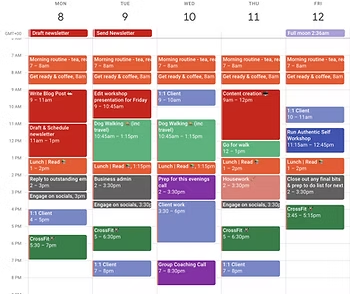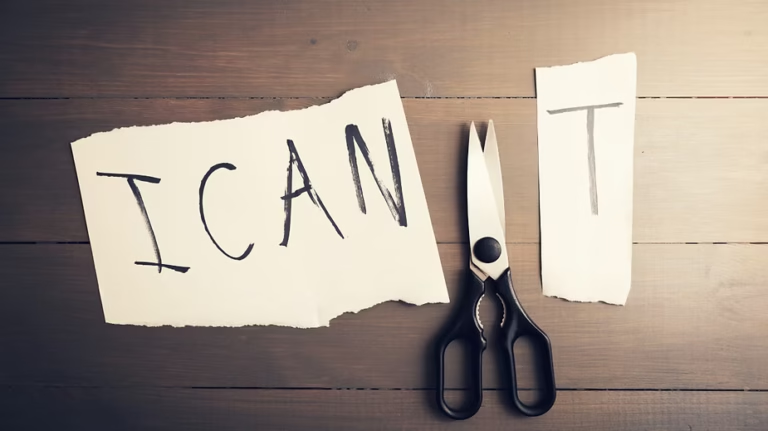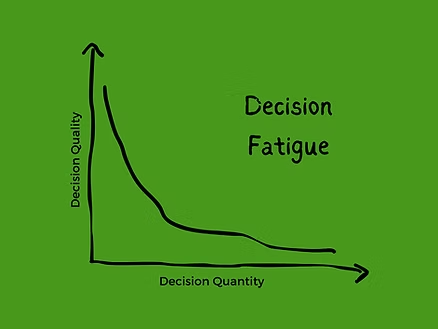The Neuroscience Behind Procrastination: Why We Delay (and How to Outsmart Our Brains)
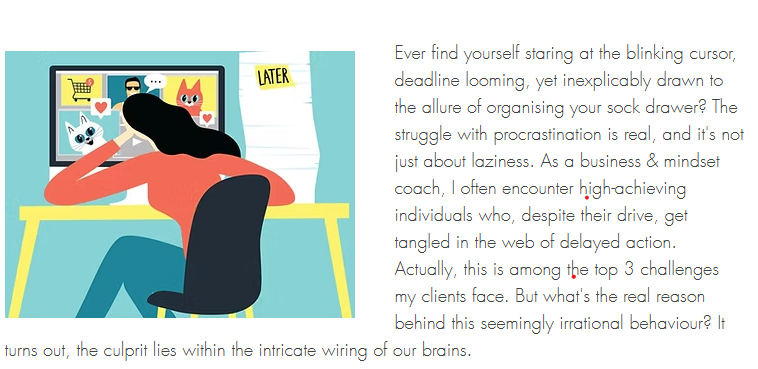
The Brain’s Tug-of-War: Limbic System vs. Prefrontal Cortex
Imagine your brain as a battlefield. On one side, you have the limbic system, the ancient, emotional part that craves instant gratification and seeks to avoid discomfort. This is where the “feel good now” signals originate, urging you to scroll through social media instead of tackling your to-do list. On the other side stands the prefrontal cortex, the logical, planning centre responsible for long-term goals and executive decision-making. This is the voice whispering, “Remember your deadline, buckle down and get started!”
In the face of an unpleasant task, the limbic system often launches a pre-emptive strike. It bombards you with negative emotions like anxiety, overwhelm, or boredom, making the task seem even more daunting. This emotional hijacking triggers the release of stress hormones like cortisol, further clouding your judgment and making it harder to focus.

The Reward System's Slippery Slope
But it's not just emotions at play. The dopamine reward system also fuels procrastination.
Dopamine, often called the “pleasure chemical”, gets triggered by activities that feel good in the moment, like checking emails, watching cat videos, or organising your sock drawer (hey, no judgment!).
These quick dopamine hits create a temporary sense of accomplishment, tricking your brain into believing it’s making progress. Meanwhile, the actual task remains untouched, and the negative consequences of procrastination (stress, guilt, missed deadlines) are conveniently pushed to the future, further weakening the prefrontal cortex’s hold.
The Neurochemical Cocktail
But the story doesn’t end there. Our brains are also fuelled by a cocktail of neurotransmitters that influence our decision-making. Some other key players, besides dopamine, in this procrastination game:
• Glutamate: This neurotransmitter helps with focus and motivation, but its levels can dip when facing challenging tasks, further fuelling the desire to escape.
• Cortisol: The stress hormone, cortisol, can paradoxically both motivate and hinder productivity. While it can create a sense of urgency near deadlines, chronic stress can also impair cognitive function and make it harder to focus.
Beyond Biology: The Psychological Layers of Procrastination
While neuroscience sheds light on the underlying mechanisms, procrastination is rarely a purely biological phenomenon. Psychological factors like:
-
Perfectionism
-
Fear (of failure or success or judgement)
-
Lack of clarity
-
Underestimating the task complexity
-
Emotional baggage
-
Overwhelm
-
And even low self-esteem
can also play a significant role.
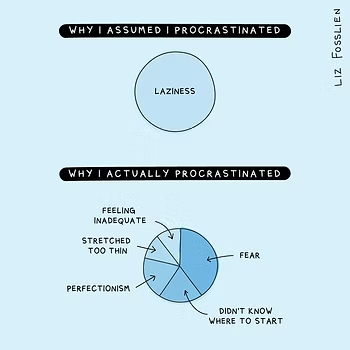
For example, perfectionists might procrastinate due to the fear of not producing flawless work, while individuals with low self-esteem might avoid tasks they believe they’ll fail at.
Breaking the Procrastination Cycle: Strategies for Success
Understanding the neuroscience behind procrastination is the first step to overcoming it. Here are some practical, actionable strategies you can use to overcome this challenge:
Acknowledge and Reframe: The first step is acknowledging the tug-of-war happening in your brain. Don’t beat yourself up for procrastinating; instead, recognize it as a natural response to discomfort. Reframe procrastination as a signal to adjust your approach, not a personal failing.
Break Down the Task: Large, overwhelming tasks activate the limbic system’s fear response. Break down the project into smaller, more manageable steps that feel less daunting. This makes the task seem less threatening and reduces the initial hurdle.
Start with “Micro-Wins”: Dopamine thrives on progress, so start with small, achievable tasks and celebrate each completion. This releases dopamine, creating a positive feedback loop that motivates you to continue.
Prime Your Environment: Minimise distractions and create an environment conducive to focus. Put your phone away, close unnecessary browser tabs, and find a quiet, uncluttered space to work. Remove temptations that could easily trigger the limbic system’s “pleasure centre.”
Leverage Rewards Strategically: While dopamine loves immediate gratification, it can also be harnessed for long-term goals. Set up a reward system that celebrates completing specific milestones, but avoid linking rewards to the avoidance of unpleasant tasks.
Cultivate Self-Compassion: Be kind to yourself during the process. Acknowledge the challenges, but don’t dwell on them. Focus on progress and celebrate small victories. Self-compassion helps reduce stress and cortisol levels, creating a more conducive environment for focus.
Seek Support and Accountability: Don’t go it alone. Share your goals and struggles with a trusted friend, mentor, or coach. Having someone to hold you accountable can be a powerful motivator.
Practice Mindfulness: Mindfulness techniques like meditation and deep breathing can help you manage negative emotions and refocus your attention on the present moment, making it easier to resist procrastination urges.
Harness the Power of Deadlines: Set realistic deadlines and leverage their urgency to motivate action.
Time boxing: Allocate specific time slots for focused work and stick to them. This helps train your brain to concentrate and avoid multitasking.
Address Underlying Issues: If perfectionism, anxiety, or other emotional factors contribute to procrastination, seek professional help to address them.
Accountability Partners: Find someone to hold you accountable for your goals and progress. Knowing someone is watching can be a powerful motivator.
Neuroplasticity: Remember, your brain is constantly changing. By practicing these strategies, you can build new neural pathways that support focus and productivity.
From Neuroscience to Action
Procrastination is not a character flaw but a natural response to our brain’s wiring. By understanding the neuroscience behind it, we can equip ourselves with effective strategies to overcome its hold and achieve our goals. Remember, the key lies in outsmarting the limbic system’s quick fixes by empowering the prefrontal cortex with long-term vision and actionable steps. With awareness and practice, we can transform procrastination into a distant memory and reveal the full potential of our minds.
Remember, overcoming procrastination is a journey, not a destination. By understanding the neuroscience behind it and implementing effective strategies, you can learn to navigate the brain’s tug-of-war and achieve your goals with greater ease and clarity. Leverage the power of neuroplasticity. The brain is constantly adapting, and new neural pathways can be formed through consistent practice. By actively engaging in strategies that promote focus and productivity, you can literally rewire your brain for success.

